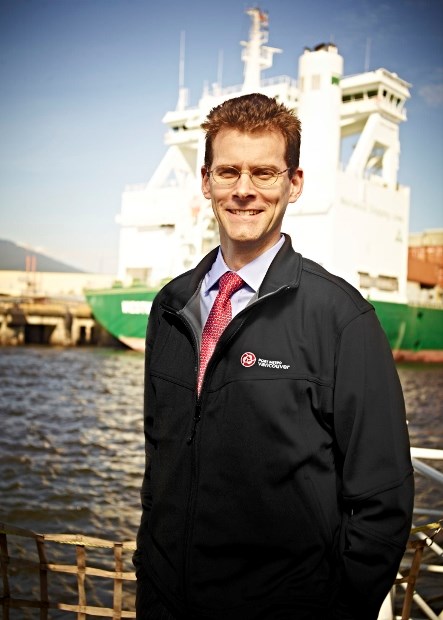Port Metro Vancouver's president and CEO Robin Silvester made a brief presentation to skeptical city councillors and Mayor Malcolm Brodie Monday at a general purposes meeting to outline the port's recent and upcoming activities in and around Richmond.
Coun. Harold Steves called it a "nonpresentation" and said it was an "excuse for the port to say it had consulted with the city and the public" on major projects of concern such as three tenant-led initiatives with PMV.
First, at the south end of No. 7 Road Lehigh Hanson Materials Ltd. has applied to develop a sand and gravel processing and distribution facility that would include two marine berths on the Fraser River. Construction would begin as early as 2018 after the site is prepared.
Second, a yet-to-be determined project will involve the old Fraser Wharves lands, near Riverport entertainment complex, which Silvester said were purchased by the port for future use.
Third, Silvester noted the contentious Vancouver Airport Fuel Delivery Project to be built by the Vancouver Airport Facilities Corporation. This project will see a jet fuel offloading facility, also to be built at Riverport but further north, as well as a new pipeline to carry the fuel across Richmond.
Port-led initiatives Silvester noted included the planned Roberts Bank Terminal 2, habitat enhancement and a $2 million five-year project to clean up abandoned boats in the river. According to the port, there are 33 such sites identified in Richmond.
Silvester spoke about the need for the port to become sustainable but was questioned on such language by Coun. Derek Dang, who noted that all of PMV's main projects are directly connected to fossil fuel production.
On the issue of land use, Silvester assured council that the port would be looking at ways to utilize existing facilities before expanding to new lands, such as those on the south arm of the river in Richmond, which the port has also purchased.
He said there is no "immediate" plan to develop zoned farmland from the Agricultural Land Reserve for industrial and shipping purposes.
Brodie noted to Silvester that he would expect farmland not to be developed for perpetuity - not just in the immediate future.
Steves said the city would have to challenge the port in court if that happened.
"The port has never gone to eradicate local zoning in the past. If they try that, it should be challenged in court to see if they have that ability," Steves told the News.
Steves also said communication between the city and the port has broken down over the years since the regional ports were amalgamated.
On the port's website an interactive mapping tool allows for public feedback through to April 13 on its land use policies.
According to the port, it handles more than $475 million of cargo daily and is Canada's largest gateway to the Asia-Pacific region.
PMV is also looking to build a coal transfer facility at Surrey Fraser Docks, which would see coal barges run up and down the river to deliver the product to a storage facility on Texada Island.



